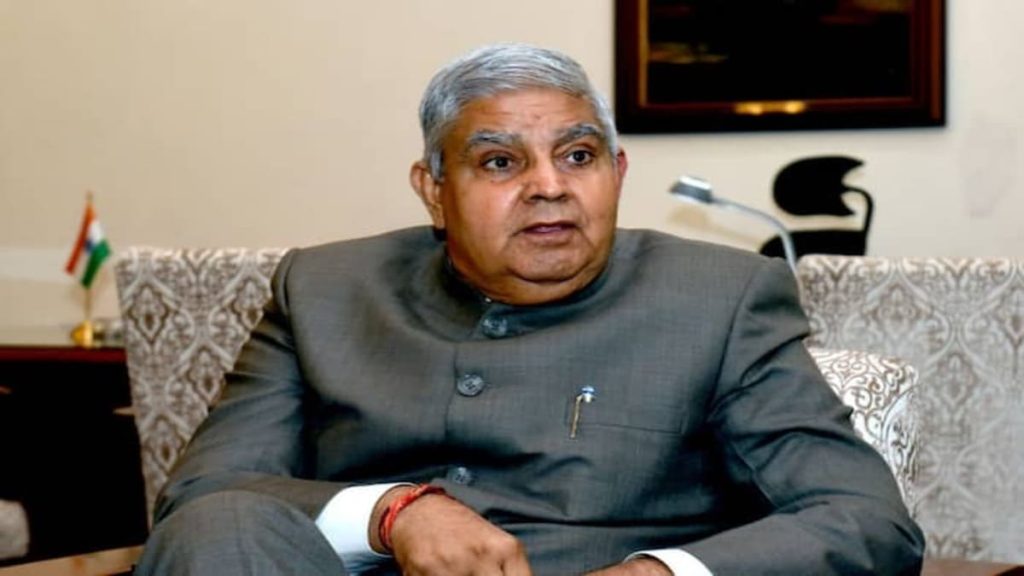New Delhi: The agenda driven journalists were focusing on MCD poll results. They did not feel to go big on Vice President Jagdeep Dhankar’s historic debut statement. In his speech delivered in the Rajya Sabha Dhankar took on the Supreme Court.
In his first speech as Chairman of the Rajya Sabha, Dhankar exposed the Supreme Court for severely compromising the parliamentary sovereignty and disregard of the mandate of the people.
He was referring to the Supreme Court undoing the 99th Constitutional Amendment Bill. The bill sought to give politicians and civil society a say in the appointment of judges to the highest courts. Presently, a collegium of Judges appoints Judges in higher courts.
Both the Houses of Parliament passed the Bill unanimously on 13 August 2014. In one of the rare occasions, the houses passed it with just one abstention.
This process fructified into a Constitutional prescription, after 16 State Assemblies out of 29 States ratified the Central Legislation; the President of India in terms of Article 111 accorded his consent on December 31, 2014.
“This historic parliamentary mandate was undone by the Supreme Court on October 16, 2015 by a majority of 4:1 finding the same as not being in consonance with the judicially evolved doctrine of ‘Basic Structure’ of the Constitution,” Dhankar said.
He added, there is no parallel to such a development in democratic history. The judiciary undid a duly legitimised constitutional prescription. This is a glaring instance of severe compromise of parliamentary sovereignty. And it is a disregard of the mandate of people of which this house and the Lok Sabha are custodians.
Dhankhar emphasised that Parliament is the exclusive and ultimate determinative of the architecture of the Constitution.
“We need to bear in mind that in democratic governance the basis of any ‘Basic Structure’ is the prevalence of primacy of the mandate of the people reflected in the Parliament. Parliament is the exclusive and ultimate determinative of the architecture of the Constitution,” he said.
Duty bound to address the issue: Dhankar
The Vice President said the Parliament is duty bound to address this contentious issue. He also expressed the confidence that the parliament will do so. “It is disconcerting to note that on such a momentous issue, so vital to democratic fabric, there has been no focus in the Parliament, now for over seven years. This House, in concert with the Lok Sabha, being custodian of the ordainment of the people, is duty bound to address the issue, and I am sure it will do so,” he said.
Dhankar also urged the Parliamentarians to proactively catalyse evolution of the wholesome cordial ecosystem ending this aberration.
“Authorities in constitutional positions in any institution are required to exemplify their conduct by high standards of propriety, dignity and decorum. Time for all constitutional institutions to reflect and give quietus to public display of adversarially challenging stance/trading or exchange of advisories emanating from these platforms. I urge the Members of the House to proactively catalyse evolution of the wholesome cordial ecosystem ending this aberration,” he said.
“It is an institutional seamless connection marked with mutual trust and respect that generates an eco system best suited for serving the nation. This House needs to catalyze this wholesome environment to promote synergic functioning of Constitutional Institutions, emphasizing the need to respect Laxman Rekha,” he added.
In 2014, the National Democratic Alliance government brought the National Judicial Appointments Commission (NJAC) Act. It was an attempt to change the system of appointment of judges.
The NJAC was a proposed body, which would have been responsible for the appointment and transfer of judges to the higher judiciary.
The NJAC Act and the Constitutional Amendment Act came into force on April 13, 2015. But the top court on October 16, 2015, struck down the NJAC Act. The verdict brought back the primacy of the collegium system of judges appointing judges.
Can Mi Lords undo bills?
The Constitution runs on the doctrine of Separation of Powers, which means that no organ of the government, either the executive, the legislature and judiciary, can interfere in the functioning of the other.
The third pillar cannot operate and exercise its power as the sovereign ruler without acquiring legitimacy from the people through their elected representatives.
In a democracy, the sovereign power rests with the people, which, as per the Constitution, is exercised through representative bodies. Therefore, the SC does not have any power to strike down the Bill that Dhankar was talking about.
Moreover, the collegium is a demonstrably poor system where the individual biases of judges can affect who gets selected or dropped and there is too much opacity in its ways of functioning.
And if the SC wants to have a say, Mi Lords should fight an election and get people’s mandate.
